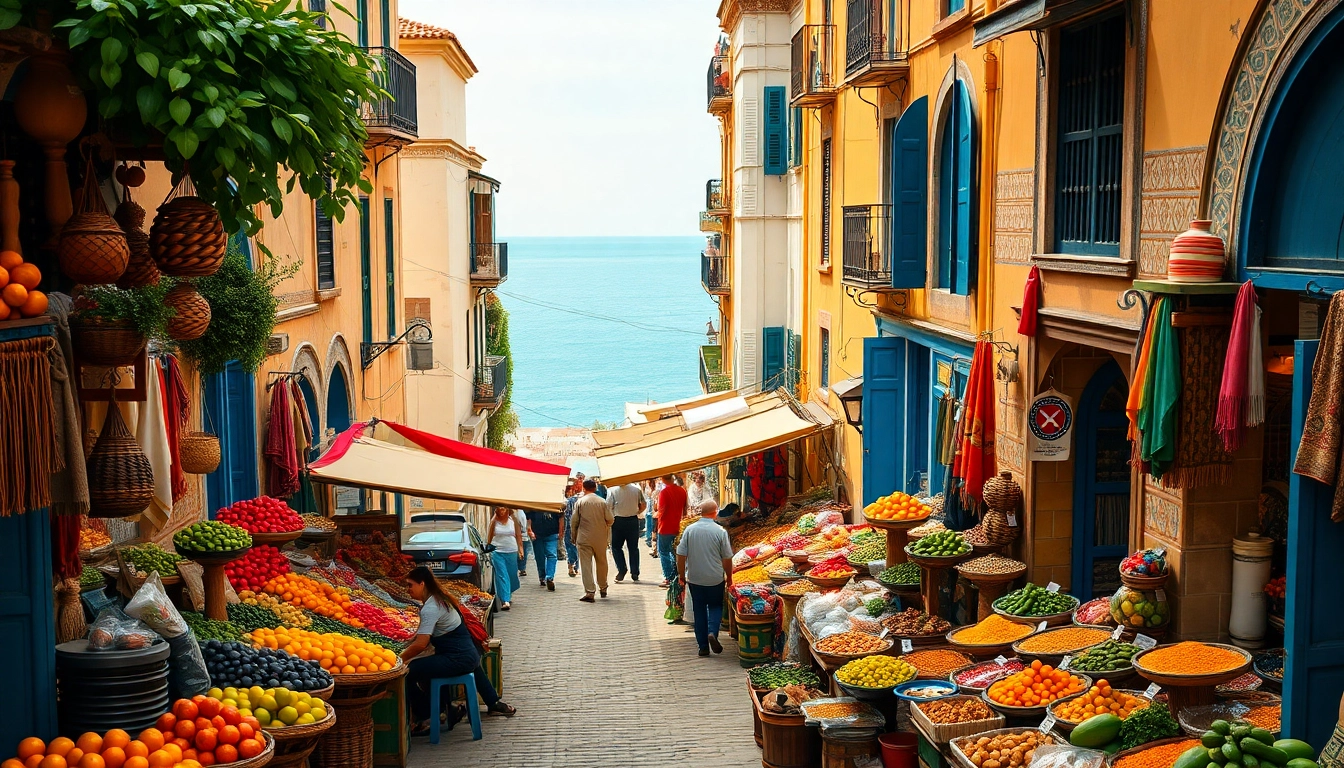Introduction to the Capital of Algeria
Algiers, the capital of Algeria, is a vibrant city steeped in rich history and culture. Nestled along the Mediterranean coastline, this city serves not only as the political heart of Algeria but also as its economic and cultural hub. From its picturesque architecture to its diverse population, Algiers has a unique charm that captures the spirit of the nation. Understanding the significance of Algiers as the capital of Algeria provides a gateway to exploring the rich tapestry of experiences this city offers, making it an essential destination for travelers.
History of Algiers
The history of Algiers is as complex and colorful as the city itself. Founded in the 4th century BC by the Phoenicians, Algiers has seen many rulers over the centuries, including the Romans, Byzantines, and Ottomans. The city’s strategic location made it a crucial port and center of trade across the Mediterranean.
In the early modern period, Algiers became a prominent base for pirate activity, especially under the rule of the Ottoman Empire. This period contributed to its reputation as a fierce naval power. However, it was during the 19th century, particularly after the French colonization in 1830, that Algiers underwent significant transformation. The French urban planning efforts brought about modernization but also left a lasting mark on its social structure.
After gaining independence in 1962, Algiers became a symbol of national pride and determination. The city has since diversified its economic base and developed its cultural identity, merging its rich past with the aspirations of modern Algeria.
Geography and Climate of Algiers
Algiers is strategically located in the northern part of Algeria along the Mediterranean Sea. The city’s geographic setting offers stunning views of the sea and the surrounding hills, providing a picturesque backdrop for both residents and visitors alike. The coastal location not only contributes to the city’s natural beauty but also to its climate, characterized by a Mediterranean climate.
Summers in Algiers are typically hot and dry, while winters are mild and wetter. This climate supports a variety of outdoor activities and attracts tourists year-round, enhancing the appeal of Algiers as a capital city worth exploring.
Why Algiers is the Capital of Algeria
As the capital of Algeria, Algiers serves as the political, economic, and cultural heart of the country. The city is home to key government institutions, including the presidential palace, ministries, and foreign embassies. Its central location along the coast allows for strategic trade routes and maritime activities that bolster Algeria’s economy.
Moreover, Algiers embodies the country’s cultural diversity, with a mix of Berber, Arab, and French influences visible in its architecture, cuisine, and daily life. This rich cultural landscape makes Algiers not just a capital but a living museum of Algeria’s enduring legacy. For those keen to understand the depth of Algerian culture and politics, visiting capital of algeria is an essential step.
Cultural Significance of Algiers
Local Traditions and Customs
The cultural fabric of Algiers is woven from numerous traditions, customs, and practices that have developed over centuries. Local customs often reflect the country’s diverse ethnic groups. For instance, traditional music genres such as Rai and Chaabi resonate throughout the city, showcasing the vibrancy of Algerian art forms.
Celebrations and festivals play an integral role in community life, with events such as the Mawlid, which commemorates the birth of the Prophet Muhammad, drawing large crowds. These traditions foster community bonds and preserve the distinct cultural identity of Algiers.
Arts and Entertainment in Algiers
Algiers boasts a rich arts scene that includes various forms of visual arts, literature, theater, and music. The city is known for its artists who often reflect their socio-political experiences in their works. Galleries and exhibitions featuring local talent can be found, making it a thriving hub for art enthusiasts.
Theater and cinema also play significant roles in the cultural landscape of Algiers. The National Theater of Algeria regularly hosts performances that celebrate Algerian history and milestones. Besides traditional forms, modern genres are equally popular, enabling the younger generation to connect with their roots while embracing contemporary expressions.
Food and Culinary Heritage of the Capital of Algeria
The culinary scene in Algiers is a mosaic of flavors influenced by its history and geographical diversity. Traditional dishes such as couscous, tagines, and the famous Algerian bread are staples in local cuisine, often prepared using age-old recipes handed down through generations.
Street food culture is vibrant, with vendors offering a variety of snacks and dishes that showcase the bold flavors of Algerian spices. For instance, Felfel Mahchi (stuffed peppers) is a popular dish that reflects the culinary creativity inherent in Algerian kitchens.
Dining experiences in Algiers go beyond food; they provide a cultural immersion for visitors. Restaurants often serve dishes in communal style, emblematic of the hospitality and warmth characteristic of Algerian culture.
Tourist Attractions in the Capital of Algeria
Historic Landmarks of Algiers
The architectural heritage found in Algiers is remarkable, featuring a mix of Ottoman, Arab, and French influences. Key historical landmarks include the Casbah of Algiers, a UNESCO World Heritage site known for its narrow winding streets and historical significance as a former stronghold.
Another prominent site is the Cathedral of Notre-Dame d’Afrique, offering stunning views of the city and a glance into its colonial past. The monument to the Martyrs of the Revolution stands as a tribute to the sacrifices made during Algeria’s struggle for independence and is an iconic symbol of national pride.
Natural Wonders Near Algiers
Beyond its urban landscape, Algiers is surrounded by natural beauty that invites exploration. The nearby Tassili n’Ajjer National Park, known for its unique rock formations and prehistoric cave paintings, is a must-visit for nature lovers. The park offers hiking and adventure opportunities amidst breathtaking scenery.
Additionally, the Mediterranean beaches provide relaxation and recreational activities, attracting both locals and tourists during the warmer months. Beaches like El Madania are perfect for enjoying sun-soaked days by the sea.
Activities for Visitors to the Capital of Algeria
Algiers offers a plethora of activities for visitors, catering to all interests. From guided city tours exploring the rich history and architecture to culinary classes where one can learn to prepare traditional dishes, there is something for everyone.
Outdoor enthusiasts can indulge in hiking, particularly in the surrounding hills, which provide panoramic views of the city. For those interested in cultural immersion, attending performances at local theaters or visiting art galleries can enhance understanding of Algeria’s diverse cultural expression.
Economy and Development of the Capital of Algeria
Economic Landscape of Algiers
The economy of Algiers plays a pivotal role in shaping Algeria’s overall economic framework. As the capital, the city houses major industries such as petrochemicals, agriculture, and manufacturing. The oil and gas sector, in particular, has been a driving force behind the national economy.
The government is actively working on diversification strategies to reduce reliance on hydrocarbons by promoting sectors such as tourism and technology. The economic policies focus on attracting foreign investment and boosting local entrepreneurship, setting the stage for sustainable development.
Impact of Tourism on the Capital of Algeria
Tourism is a significant contributor to the economy of Algiers, offering numerous job opportunities and fostering cultural exchange. Sites such as the Casbah and the picturesque waterfront draw visitors from around the globe, aiding local businesses and artisans.
Efforts to enhance tourism infrastructure, including improved transport systems and hospitality services, are underway. These developments aim to boost visitor numbers and provide an enriching experience that showcases the beauty and depth of Algerian culture.
Future Prospects for Algiers’ Development
Looking ahead, Algiers is poised for considerable growth and development. Urban planning initiatives aim to modernize infrastructure while preserving historical sites, allowing for a blend of modernity and tradition. Sustainable practices in tourism and commerce are being championed to ensure economic growth without compromising environmental integrity.
The promotion of Algiers as a cultural and economic hub in the Mediterranean region reflects its potential for advancement. Investments in education and technology are expected to cultivate a skilled workforce capable of adapting to future demands, ensuring the city’s role as a vital center for Algeria and beyond.
Travel Tips for Visiting the Capital of Algeria
Best Time to Visit Algiers
The ideal time to visit Algiers is during the spring (March to May) and autumn (September to November) seasons when the weather is mild and pleasant. These months provide an excellent opportunity to explore outdoor attractions and participate in local festivals.
Transportation Options in the Capital of Algeria
Algiers is well-served by public transportation, including buses and trams that connect various parts of the city. The metro system is also a convenient option for navigating urban areas. Additionally, taxis and ride-sharing services offer flexibility for travelers needing direct transportation.
Safety and Travel Recommendations for Algiers
Like any major city, Algiers has its safe and less secure areas. It is advisable for visitors to stay informed about local customs and regulations. Exercising standard travel precautions, such as avoiding isolated areas at night and keeping valuables secure, can enhance safety while exploring the city.
Engaging with local guides and participating in organized tours can provide a richer and safer experience, allowing visitors to enjoy the full breadth of what this stunning capital has to offer.



